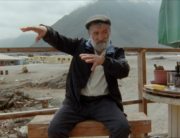7 Boxes has been referred by Indiewire as “The Fast and the Furious with wheelbarrows.” I can’t say this is a desirable comparison, but I can say it isn’t accurate. High-speed, life-threatening chases may be mildly compelling involving cars, but they become comical with wheelbarrows.
The gritty film centers around a teen pushcart porter named Victor (Celso Franco), whose life is dramatically altered in the span of 24 hours. Wandering through the boisterous and chaotic markets of Asuncion, Paraguay, Victor is recruited to transport seven boxes filled with mysterious content to the other end of the market—a seemingly simple task. Victor is eager to reap the other half of the 100 American dollars promised to him. Hunted by the police, his employers, and the rival porter who was originally supposed to perform the delivery, Victor is aided in dodging these predators by his childhood friend Liz (Lali González).
Far more than an action film concerned only with chase scenes, 7 Boxes combines the milestones of adolescence with a commentary on the culture of television and materialism, and is successful save for the film’s conclusion. The film opens with abrupt, horror movie-like shots of the market place. Clusters of fruit, clothing, and people clog the narrow stalls. The mundane act of grocery shopping is depicted as a menacing ritual.
Victor dutifully pushes his cart, wearily observing the exchange of capital. His day is littered with periodical longing for camera phones, televisions, and cold hard cash. More than anything, he seems to want to be on television, at one point stopping to admire his appearance on the many TV sets in an electronics shop. In other scenes, he sees the mirage of his own image within the roles of actors on television: driving a sports car in a tuxedo, cradled and kissed by a beautiful woman. These scenes are clearly framed as the naïve desires of a 17-year-old boy, and embellished with an uplifting score that distracts from the otherwise serious tone.
Yet 7 Boxes maintains an unkempt charm that is direct and spot-on. The camera work is often shaky and revels in its low-budget look, but this appears to be an active choice rather than an inevitable outcome. Tying in with the dependence upon cell phones, the shots often take on the grainy quality of early Nokia camera phones. Characters move around the screen in short, jabbing edits rather than by way of fluid motion, a technique consistent with the film’s subject matter.
Up until a certain point, 7 Boxes left me ambivalent. While I wasn’t so invested in the livelihood of the characters, I respected the innovation of the story line, particularly with its magnification of a specific petri dish of human activity: the Paraguayan market place. However, when the climax involved Victor being chased down by a gang of wheelbarrow toting hoodlums, I couldn’t help but roll my eyes. A young kid endangered by heat-packing criminals is risky enough, but there is nothing terrifying about five evildoers wheeling their empty carts towards a teenager in a parking lot. (If you were going to chase someone down, wouldn’t you ditch the barrow and hit the ground running?) But overall, 7 Boxes is a nuanced look at a country not often seen on screen internationally.







Leave A Comment